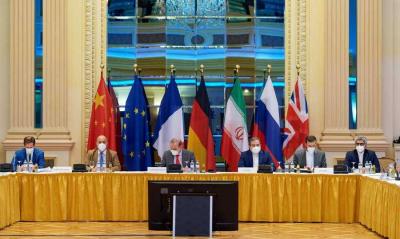A pessimistic nuclear atmosphere has overshadowed the discussions in Vienna following the recent visit of the European Union's nuclear negotiations coordinator with Iran, Enrique Mora. However, the statements made by the EU's foreign policy chief, Josep Borrell, hinted at a potential positivity, as he suggested a breakthrough in the deadlock that had ensnared the talks after months of marathon discussions aimed at reviving the 2015 nuclear agreement. Borrell, speaking from Germany where he is participating in a G7 foreign ministers meeting, revealed that "the negotiations were stalled and have been reopened after Mora's visit," adding that Iran's response was "positive enough," following the European coordinator conveying a message that things could not continue as they were. He further stated, "These matters cannot be resolved overnight... Let’s say negotiations were stalled and the situation was unblocked, which means there is a possibility of reaching a final agreement." However, he did not clarify whether those talks would resume on a specific date.
In this context, Lebanese politician Dr. Tawfiq Hindi noted through "Al-Markazia" that "Iran is not in a hurry. It continues to enrich [uranium] during the stagnation of negotiation movements, reaching a point where it could become a threshold state capable of producing a nuclear bomb without making the decision to do so." He pointed out that "the West has occupied itself with addressing Russia's issues in Ukraine, while the nuclear negotiations have been stalled for two months."
The policy of sanctions on Russia in a globalized economy has led to a drastic spike in fuel prices, allowing Iran to sell its oil through convoluted routes. Thus, it is not in a rush to reach an agreement with the U.S. to increase its fuel production, especially since this would harm its Russian ally by depriving it of a strong leverage against its Western adversaries. Hindi explained that negotiations are stalled due to two main issues: first, there has not been enough recent emphasis on Iran's longstanding primary condition, which is demanding U.S. guarantees that it will not withdraw from the agreement and reinstate sanctions as occurred during Donald Trump's era. This condition is unfeasible for President Biden, as it would require transforming the agreement into a treaty that needs a 60-member majority in the Senate, while Republican members (50 in total) and some Democratic members oppose this approach.
Second, a new condition has emerged recently: the removal of the "Islamic Revolutionary Guard Corps" from the terrorism list. Again, there is significant difficulty for Americans to fulfill this requirement, especially since it is unrelated to the nuclear negotiations. A timid American proposal and some European suggestions have emerged regarding removing the "Islamic Revolutionary Guard Corps" but keeping the "Quds Force," which is responsible for exporting the Iranian Islamic revolution worldwide, on the terrorism list. Thus, the likelihood of Americans meeting these conditions seems bleak, particularly since Biden is unlikely to pursue this condition with strong opposition in Congress, further complicated by upcoming midterm elections.
Meanwhile, Iran is playing for time, mastering diplomatic maneuvers, and aware that its conditions are unachievable. Additionally, Borrell and Mora have been working on the negotiation track for over a year without reaching results, and it does not seem they will achieve any. What are the other solutions? Hindi mentions that Americans are discussing alternative solutions in case negotiations fail, which practically involves reinstating sanctions and diplomatically isolating Iran. However, it has become clear that this policy does not yield results, as past experiences have shown that totalitarian regimes like the Russian and Iranian systems possess enduring resilience, evidenced by the fact that Iran has been under sanctions for 44 years, while its jihadist and expansionist project continues to progress regionally.
Currently, the West is occupied with other issues, including Ukraine, while its interest in the Middle East remains secondary. However, countries in the region, such as Israel and Gulf states, feel a significant threat from the Iranian menace, particularly if Iran is left unchecked, as its power will then amplify. If it were to acquire a nuclear bomb at some point, the situation in the region would escalate even further.




